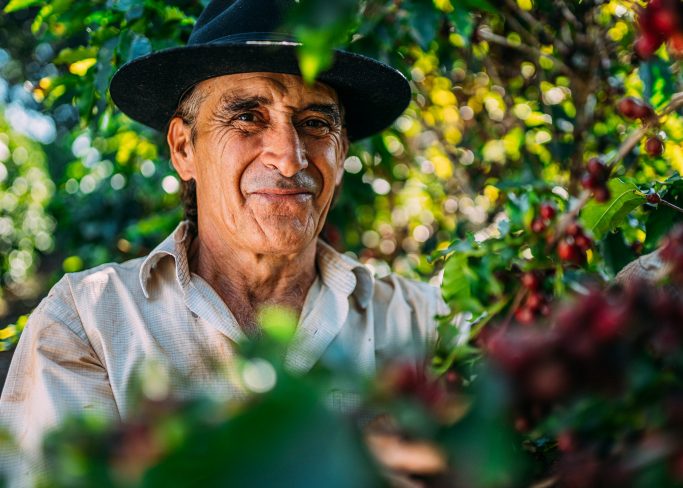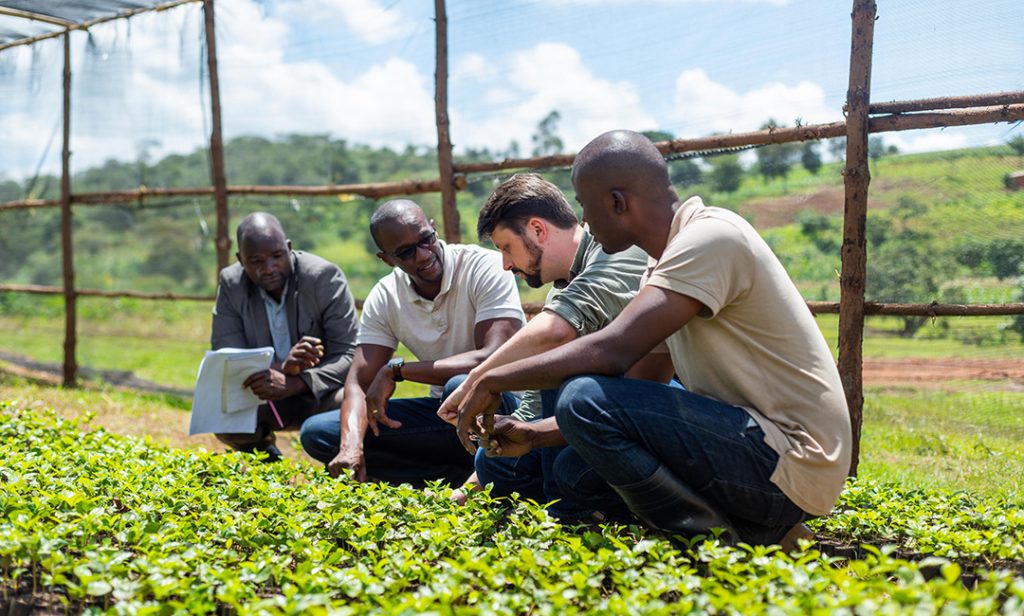Sustainability Policy
JOH. JOHANNSON KAFFE ensures sustainable development by balancing profitability, the environment, the working environment and social responsibility.

JOH. JOHANNSON KAFFE ensures sustainable development by balancing profitability, the environment, the working environment and social responsibility.

The three pillars of our sustainability concept are: society, environment and economy. Sustainability means that social, ethical and environmental considerations permeate our decisions and that we ensure that JOH. JOHANNSON KAFFE AS is a profitable business.
As a responsible player in the international coffee trade, we recognize the challenges presented by the sector, and our responsibility to choose good solutions to ensure environmental, economic and social development throughout the supply chain, and to actively contribute to the achievement of the UN's Sustainability Development Goals.
The UN's Sustainable Development Goals are the world's joint action plan for sustainable development. We seek to contribute to the world attaining the goals needed by taking responsibility for our business, our purchases and our actions.
Progress towards a low-emission society requires that all social actors reduce their own climate and environmental footprint and assess climate risks.
We take climate issues seriously, and wish to limit any climate impacts from our coffee production. This means that we need to focus on energy efficiency measures, renewable and sustainable resources and to work to reduce the climate footprint (CO2) throughout the value chain.
JOH. JOHANNSON KAFFE AS acknowledges its responsibility to continuously contribute to reducing environmental impact. In order to organize, structure and document our ongoing work, we have chosen to obtain certification in accordance with ISO14001, which is limited to the Vestby location. This is exemplified in our defined environmental aspects and the scope of the management system.
The environmental aspects are an integral part of the business decisions made by the company. We focus on reducing our burden on the environment and, in particular, on those aspects to do with waste management, energy use and accidental pollution.
We aim to fulfill our compliance obligations related to laws and regulations and our stakeholder needs and expectations, asdescribed in the stakeholder analysis.

For JOH. JOHANNSON KAFFE AS, responsible procurement practice is one of the most important tools in our work to achieve sustainable business practices. Responsible procurement practice, how we ensure sustainability through procurement, is an essential part of JOH. JOHANNSON KAFFE AS work employing due diligence assessments and is one of the most effective tools we have to prevent potential or actual negative impact in our supply chains.
Due diligence assessments are a defined method (UNGP and OECD) for a risk-based approach to respecting and safeguarding people, society and the environment in the value chain. We employ a comprehensive routine to ensure that the requirements that we set retrospectively in the value chain are met, and the aim is to create, document, implement and maintain an effective management system.
Risk assessments need to be carried out on all suppliers of raw materials, packaging and merchandise. These risk assessments are implemented with the aim of identifying products or suppliers having a particularly high risk of violations of human rights and the environment. Our due diligence assessments should enable us to identify, prioritize and manage our direct or indirect impact on people, society and the environment in our value chains.
JOH. JOHANNSON KAFFE AS is committed to ensuring that its own purchasing practices contribute to strengthening, rather than undermining, sustainability in our value chains. Thanks to our responsible purchasing practices, we are able to work with and support our suppliers in their efforts to ensure correct working conditions and to safeguard the climate and the environment by, for example:
If our actions/activities cause or contribute to any negative impact, we are obliged to halt this activity, and then do our level best to remediate the damage. Where the supplier is responsible for the negative impact/damage, the supplier is responsible for remediation.
JOH. JOHANNSON KAFFE AS recognizes its responsibility to preserve rainforests and other natural forestation with high conservation value, and is committed to working systematically and purposefully to ensure that our products do not contribute to deforestation. No raw materials will be produced from land that has been illegally deforested.
Forests play a significant role in reducing the risk of natural disasters, including floods, droughts, landslides and other extreme events. At a global level, forests reduce climate change through carbon sequestration, contribution to the balance of oxygen, carbon dioxide and moisture in the air. They also protect watersheds, which supply 75% of the world's fresh water.
Preventing loss of forests is part of the climate solution – Preserving rainforests will slow down global climate change.
Coffee beans for JOH. JOHANNSON KAFFE AS must be produced in plantations operating in accordance with national laws and regulations. Such plantations must also be certified in accordance with the Rainforest Alliance 2020 standard, thereby meeting the requirements for traceability, production standards and value chain control systems that ensure, fro example:
By choosing to use certified raw materials, we support the producers through training in certification methodology, sustainable cultivation and processing of green coffee. The various certification standards work to preserve biological diversity, introduce climate-smart farming methods, protect local ecosystems, reduce the use of pesticides and protect pollinators, and not least – protect workers' rights.

We have clear ethical guidelines and demand honesty and fairness in all matters relating to our business activities. JOH. JOHANNSON KAFFE AS is committed to safeguarding the rights, health and safety of its employees, whilst at the same time providing workplaces where people prosper and develop in line with the needs of the business. Our value creation is strengthened by our involvement of employees and their representatives, and by our placing a focus on diversity and competence.
Our suppliers are also our partners in our quest to ensure sustainable development in the industry. JOH. JOHANNSON KAFFE AS wishes to create long-term supplier relationships with suppliers who share our values and display a willingness and ability to work on positive development in the supply chain. Because of this, all our suppliers need to agree with our ethical guidelines (Code of Conduct) which are based on internationally recognized UN and ILO conventions. The principal objectives of our ethical guidelines for suppliers are to protect individuals against violations of human rights and labor rights, and to ensure respect, equality, a living wage, and a safe and healthy working environment in our supply chain.
International cooperation with our competitors, who are also our colleagues in the coffee sector, strengthens the global partnership for sustainable development. As a partner in International Coffee Partners and Coffee&Climate, we mobilize and share knowledge, expertise, technology and financial resources in a number of impoverished producer countries. This contributes to a better daily life and a brighter future for many coffee farmers. Important areas in our work to achieve sustainable development are human rights, climate change, poverty, health and pollution, vulnerability and economic development.
It is important that employees are paid fairly for their time and their work, and ensured an environment with safe working conditions. Unions can help employees to organize and create lists of negotiable demands to improve their wages and working conditions, etc.
Freedom of association is enshrined in the Universal Declaration of Human Rights and is one of the ILO's core conventions. It facilitates economic and social progress through its emphasis on equality and protection of workers. Freedom of association and collective bargaining are also outlined by the ILO in the Sustainable Development Goals Decent Work Agenda (SDG8) and are fundamental to companies' work with sustainability and responsible business behavior.
The absence of freedom of association, collective bargaining and worker representation is an outstanding risk for workers. And this risk is especially high in global value chains having a weak legal framework for the protection of workers' rights.
Responsible businesses ensure efforts to implement freedom of association, collective bargaining and worker representation.
In order to clarify our attitudes towards our suppliers, our own employees and other partners, JOH. JOHANNSON KAFFE AS has implemented ethical guidelines based on the internationally recognized requirements for labor and human rights as spelled out by the UN and ILO conventions. All employees and suppliers of JOH. JOHANNSON KAFFE AS are required to act in accordance with our ethical guidelines.
Employees and shop stewards in JOH. JOHANNSON KAFFE AS are required to follow the laws and regulations that apply and carry out their work in accordance with good business practice, our value base and the ethical principles. Included in this, JOH. JOHANNSON KAFFE AS entertains zero tolerance for corruption.
All transactions conducted by JOH. JOHANNSON KAFFE AS are required to be contractual, legal and of a normal business nature.